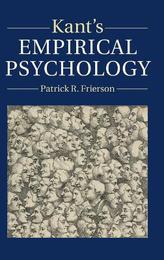
|
Kant's Empirical Psychology
Hardback
Main Details
| Title |
Kant's Empirical Psychology
|
| Authors and Contributors |
By (author) Patrick R. Frierson
|
| Physical Properties |
| Format:Hardback | | Pages:288 | | Dimensions(mm): Height 235,Width 160 |
|
| ISBN/Barcode |
9781107032651
|
| Classifications | Dewey:150.92 |
|---|
| Audience | | Professional & Vocational | |
|---|
| Illustrations |
5 Line drawings, black and white
|
|
Publishing Details |
| Publisher |
Cambridge University Press
|
| Imprint |
Cambridge University Press
|
| Publication Date |
17 July 2014 |
| Publication Country |
United Kingdom
|
Description
Throughout his life, Kant was concerned with questions about empirical psychology. He aimed to develop an empirical account of human beings, and his lectures and writings on the topic are recognizable today as properly 'psychological' treatments of human thought and behavior. In this book Patrick R. Frierson uses close analysis of relevant texts, including unpublished lectures and notes, to study Kant's account. He shows in detail how Kant explains human action, choice, and thought in empirical terms, and how a better understanding of Kant's psychology can shed light on major concepts in his philosophy, including the moral law, moral responsibility, weakness of will, and cognitive error. Frierson also applies Kant's accounts of mental illness to contemporary philosophical issues. His book will interest students and scholars of Kant, the history of psychology, philosophy of psychology, and philosophy of action.
Author Biography
Patrick R. Frierson is Associate Professor of Philosophy at Whitman College. He is the author of Freedom and Anthropology in Kant's Moral Philosophy (Cambridge, 2003) and Kant's Questions: What Is the Human Being? (2013), and has published numerous articles in edited volumes and journals including Philosophers' Imprint and the Journal of the History of Philosophy.
Reviews'With this lucid explanation and analysis of Kant's empirical psychology, Patrick R. Frierson makes a major contribution to Kant scholarship. Up till now, the general lack of familiarity with this aspect of Kant's philosophy has led many to conflate his moral theory and his empirical psychology, which in turn has produced many misguided objections and caricatures. Frierson's clear and balanced discussion enables readers to gain a deeper understanding of Kant's empirical account of human cognition and action, and to situate it properly in its broader philosophical context.' Pauline Kleingeld, Rijksuniversiteit Groningen, The Netherlands
|